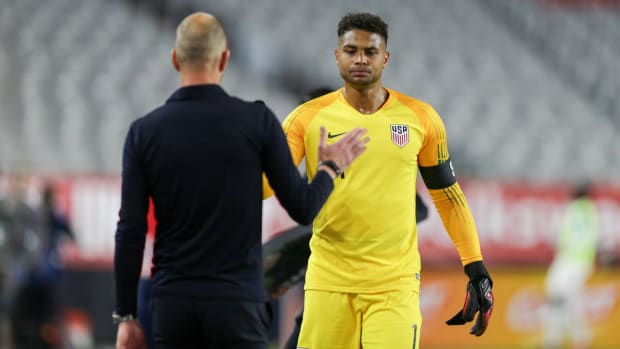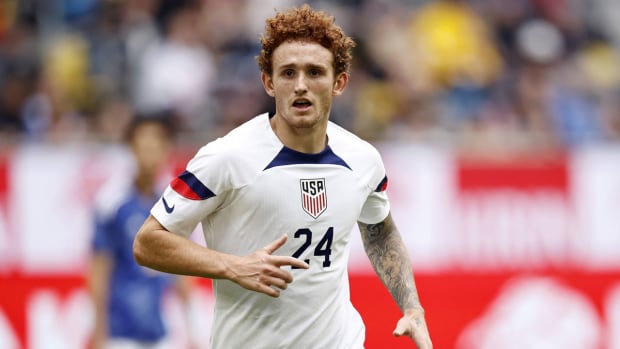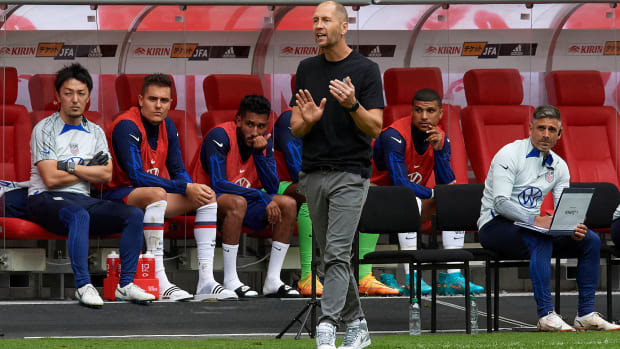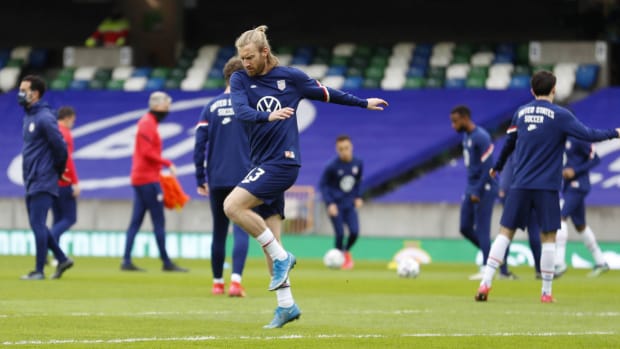On Sunday, there was joy. That was the day U.S. men’s national team coach Gregg Berhalter began informing his 26 World Cup players that they were confirmed for Qatar.
Then came the hard part.
“Then I started working on the guys that weren't going to be on the team, and those were when the real difficult conversations started,” the coach said Wednesday night in Brooklyn shortly after the World Cup roster reveal.
Berhalter suggested that the toughest moments came during talks with goalkeeper Zack Steffen, winger Paul Arriola and striker Ricardo Pepi—World Cup qualifying contributors and established members of the U.S. pool who were left off the final roster. That disappointment and discomfort would’ve been balanced, however, by the elation of men who may have worried they’d wind up on the outside looking in, like defender Tim Ream, striker Haji Wright and midfielder Cristian Roldan.
“When you can feel that emotion through the FaceTime call, that’s when it's really special,” he said. “And a lot of those guys you really felt it—it was a lot. It was heavy. But it was a pleasure being able to make those calls.”
Berhalter was reluctant Wednesday to go into the decision to omit Steffen, who appeared to be the clear No. 1 as the youthful U.S. started to gel in the summer of 2021. Steffen, 27, was at Manchester City at the time (he’s now on loan at Middlesbrough) and teamed up with Berhalter in Columbus. Steffen backstopped the Crew to the 2017 MLS Eastern Conference finals, where they lost narrowly to treble-bound Toronto FC. He then was the league’s Goalkeeper of the Year in ’18.
Even as Matt Turner as emerged last fall as competition for the starting role, Steffen appeared certain to battle for the spot in Qatar. His wholesale exclusion from the squad was stunning.

John Dorton/ZUMA Press/Imago Images
“Me and Zack go way back, and Zack's been there for me a bunch of times. And to tell him he's not going to be part of the World Cup team was heartbreaking for me,” Berhalter said.
The contents of that call remain private. Berhalter didn’t go into the specific reasons for Steffen’s absence, but did reveal what he liked about Ethan Horvath and Sean Johnson, the two other keepers selected.
“The goalkeeper position you do evaluate somewhat differently,” Berhalter added. "I think we were, again, looking at a guy like Sean Johnson, who's been with this program since day one ... and we think he's a really valuable piece of the team.
“Ethan is a guy that always responds when his number's called. Let’s not forget, this is a guy that got subbed into the [EFL] Championship final last year and was able to hold on and get [Nottingham Forest] to victory,” he continued. “He subbed onto our [2021] Nations League final, if you guys remember that, and ended up saving the penalty kick. He's a guy that's Johnny-on-the-spot. If you need him, he’s ready. And I think that's valuable in a World Cup-type of competition.”
The call with Pepi was another tough one. The 19-year-old FC Dallas product set the national team alight with goals in the Americans’ first two qualifying victories, wins over Honduras and Jamaica last September and October. He was a significant reason the U.S. pulled its Octagonal campaign back on track, and the Pepi Train seemed destined to roll into Qatar. But those goals were his most recent for the U.S.. and his difficulty adjusting to Augsburg and the Bundesliga meant a loan this season to Dutch club Groningen. Pepi has an impressive six goals in nine games in the Netherlands, but that wasn’t enough to move him past Jesús Ferreira, Josh Sargent and Haji Wright.
“Ricardo Pepi could have a great argument for why he should be there, and I can understand that argument. But we had to choose to bring three strikers and these are the three that we chose,” Berhalter said.
Like with Steffen, the manager chose not to focus on Pepi’s shortcomings—or on those of Jordan Pefok, the Union Berlin striker who also may have a claim on a World Cup spot—but rather on why he chose the other three.

ANP/Imago Images
“Jesús is a guy that we see very good overall understanding of our game model. [He] has the ability to really bring other players into the game as well—clever with his movement in and around the penalty box and then really good ability to press the opponent,” Berhalter said of the FC Dallas forward who emerged as a frequent first choice this year.
“[Sargent] does a lot of things well. He's also competing against these guys from [World Cup opponents] England and Wales every single week. He’ll have familiarity with the opponent, which we think will be valuable. And I think gives a physical presence with his aerial duels and his competitive nature that's going to help this group,” he continued.
“Haji, I think, gives us a little bit more physicality with his height [compared to] Josh, can figure at the start of the game or late in the game—bring him on for set pieces—defending set pieces [or] attacking set pieces. [He’s] good in transition, good running the channels, good finishing in the penalty box one-time [and with] both feet, and can score with his head. So I think overall, it's a really well-balanced forward line.”
Berhalter said the third striker slot came down to Wright and Pefok. Neither has done enough with the U.S. to offer much long-term benefit of the doubt, so it came down to form. Wright, 24, has nine goals in 12 games, including four in the past four, for Antalyaspor, the ninth-place team in the Turkish Süper Lig. Pefok, 26, has four goals in 18 matches for Union Berlin, the second-place side in the Bundesliga. His most recent goal came on Sept. 18.
“We were evaluating Haji versus Jordan Pefok, and that's what it came down to. And in this particular case, we felt like Haji is in great goalscoring form,” Berhalter explained. "They’re both physical strikers. Jordan, maybe a little more so. But Haji has pace. He's got the ability to go 1-v-1. He’s got finishing with his head, both feet, and he's performing really well in the Turkish League. … This is not an easy league to score goals in, and he's doing a good job.”

Jose Breton/NurPhoto/Imago Images
Paul Arriola was a notable omission because of the way in which Berhalter prizes both chemistry and fit within the group, and energy on both sides of the ball from his wingers. Arriola, 27, wouldn’t have been a starter in Qatar, but there’s a reason the FC Dallas star has been part of every senior camp since he missed the September 2021 qualifiers with an injury.
The timing was good for Wright. It was bad for Arriola.
“That was another really, really difficult decision to make—really painful conversation with him because he has been there since day one,” Berhalter said. “He’s been involved in a lot of these competitive games that we've been playing. For one reason or another, we haven't always had our wingers fit and available. As we lead up to the World Cup, every one of those players is fit and available. And it just [meant] that Paul was the odd man out, and it sucks. It's the worst thing to have to tell him that we feel that there's other players, those other wingers, that are ahead of him.
Jordan Morris, Tim Weah, Gio Reyna and Christian Pulisic have all had injury spells over the past couple years. They’re now healthy, and so Arriola will be left behind.
While the wingers have healed, injury issues hit the center of the U.S. defense. Miles Robinson was lost to an Achilles tear in May, and Chris Richards just bowed out this week because of persistent hamstring trouble. While Walker Zimmerman seemed locked in as one starter, the other spot seemed up for grabs. So re-enter Tim Ream, the 35-year-old who hadn’t played for the U.S. since early September ’21—more than 14 months ago—but who was a relatively easy World Cup selection, according to Berhalter.
“A little bit unexpected in certain ways, not being really heavily involved over the past year,” Ream told U.S. Soccer. “It’s a dream come true and something you never expect, or fully expect, that you’re going to have that opportunity. So it’s one I’m grateful for.”
Ream’s consistent quality in the Premier League, home to many of the men the U.S. will face in its first two games in Qatar, made the difference for Berhalter. And while Ream may have been away from the group recently, his 46 caps are enough to establish plenty of familiarity and international pedigree.

Liam McBurney/PA Images/Imago Images
“It's about what he's doing on the field. And in Tim's case, he was in the Premier League three years ago and he struggled. The whole team struggled. And he went to the Championship and he started performing better, and [Fulham] got promoted, and now he's in the Premier League and he's a top performer for his team. It's really hard to ignore stuff like that. And by the way, he's been a guy that's been with us since day one. So to me, all the pieces were aligned to bring him back into the squad.
“There is, in my opinion, a difference between qualifying in Concacaf and playing in the World Cup,” Berhalter added. “Tim, based on what we're seeing, the level he's playing at, he’s ready to play in a World Cup for sure.”
Berhalter and several players were scheduled to fly to Doha late Wednesday, with the whole group expected to be in the country for the first official training session on Monday. That’s also the day each country’s official 26-man roster is due to FIFA (injury swaps can be made up to 24 hours before a given team’s first game). Although there are a few fresh or old faces, most of the U.S. group has been growing together for at least a couple years. That’ll matter with the quick turnaround in Qatar. The Wales game is Nov. 21, just a week after practice begins.
“You focus on two things, what you do on the field and how you support each other off the field. Those two things are really important to be successful,” the coach said. “We feel this is a cohesive roster. And we feel that we're going to be able to use the time period that we have the week before the tournament to get everybody ready.”







